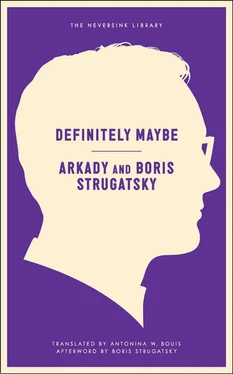“After all, there are pressures that no man in the world could bear.”
Vecherovsky answered something, but I didn’t hear him or I didn’t understand it. I was realizing that just yesterday I was a man, a member of society. I had my own concerns and worries, yes, but as long as I obeyed the laws created by the system—and that had become a habit—as long as I obeyed those laws, I was protected from all imaginable dangers by the police, the army, the unions, public opinion, and my friends and family. Now, something in the world around me had gone haywire. Suddenly I became a catfish holed up in a crack, surrounded by monstrous vague shadows that didn’t even need huge looming jaws—a slight movement of their fins would grind me into a powder, squash me, turn me into zilch. And it was made clear to me that as long as I hid in that crack I would not be touched. Yet it was even more terrifying than that. I was separated from humanity the way a lamb is cut off from the herd and dragged off somewhere for some unknown reason, while the herd, unsuspecting, goes on about its business, moving farther away into the distance. I would have felt much better if only they had been warlike aliens, some bloodthirsty, destructive aggressors from outer space, from the ocean depths, from the fourth dimension. I would have been one among many; there would have been a place for me, work for me; I would be in the ranks! But I was doomed to perish in front of everyone’s eyes. No one would see a thing, and when I was destroyed, ground to dust, everyone would be surprised and then shrug it off. Thank God Irina wasn’t around. Thank God this wasn’t affecting her! A nightmare! Unbelievable nonsense! I shook my head as hard as I could. This whole mess because I’m working on interstellar matter?
“Apparently, yes,” Vecherovsky said.
I stared at him in horror.
“Listen, Phil, it doesn’t make any sense!” I said desperately.
“From the human point of view, none at all,” Vecherovsky said. “But it’s not people who have something against your work.”
“Then who does?”
“There you go again—a question as good as gold,” Vecherovsky said, and it was so unlike him that I laughed. Nervously. Hysterically. And I heard his satisfied Martian guffaws.
“Listen,” I said, “the hell with them all. Let’s have some tea.”
I was afraid that Vecherovsky would say that it was time for him to go, that he had to give exams tomorrow or finish his chapter, so I hurriedly added:
“All right? I’ve got a box of candy hidden away—I figured, why feed Weingarten’s fat face with everything. Let’s indulge!”
“With pleasure,” Vecherovsky said, and he got up readily.
“You know, you think and think,” I said as we went into the kitchen and I put on the water. “You think and think until it all goes black. That’s wrong. That’s what did in Snegovoi. I know that now. He was sitting in his apartment all alone, turning on all his lights, but what good did it do? You can’t light that kind of darkness with all the lamps in the world. He thought and thought and then something clicked and that was the end. You can’t lose your sense of humor, that’s the ticket. It really is funny, you know: All that power, all that energy—just to stop man from finding out what happens when a star falls into a dust cloud. I mean, just think about it, Phil! That’s funny, isn’t it?”
Vecherovsky was looking at me with an unusual expression.
“You know, Dmitri,” he said, “I somehow never considered the humorous aspect of the situation.”
“No? Really, when you think about it… So there they are and they start figuring things out: a hundred megawatts on research of annelid worms, seventy-five gigawatts for pushing through this project, and ten will be enough to stop Malianov. And someone objects that ten isn’t enough. After all, you have to drive him crazy with phone calls, one; give him cognac and a woman, that’s two.” I sat down with my hands tight between my knees. “No, it really is funny.”
“Yes,” Vecherovsky agreed. “It is rather funny, but not very. Your paucity of imagination is staggering. I’m surprised you managed to come up with your bubbles.”
“What bubbles!? There weren’t any bubbles. And there won’t be. Stop badgering me, mister director, sir. I saw nothing, heard nothing, I see no evil, hear no evil. I have a witness, I wasn’t there. And anyway, my official work is on the IK spectrometer. All the rest is just the hubris of intellectuals, a Galileo complex.”
We sat in silence. The teapot started to wheeze softly and make a “pf-pf-pf” noise as it got ready to boil.
“Well, all right,” I said. “Paucity of imagination. Agreed. But you must admit that if you forget the fiendish details, the whole thing is fascinating. It looks like they really do exist. People gabbed so much, guessed so much, lied so much, inventing those idiotic saucers, mysterious explanations for the Baalbek terrace… and they really do exist. But, of course, not at all the way we had thought. I was always sure, by the way, that when they announced themselves, they would be completely different from everything we had invented about them.”
“Who are ‘they’?” Vecherovsky asked distractedly. He was lighting up his pipe.
“The aliens,” I said. “Or to use the scientific term, the supercivilization.”
“Aha,” Vecherovsky said. “I get it. Nobody’s ever suggested that they might be like policemen with aberrant behavior patterns.”
“All right, all right,” I said. I got up and set out two tea settings. “I may have a paucity of imagination, but you have none at all.”
“Probably,” Vecherovsky agreed. “I am totally incapable of imagining something that I think cannot exist. Phlogiston, for instance, a thermogen, or, say, the universal ether. No, no, please brew some fresh tea. And don’t skimp.”
“I know how to make it,” I grumbled. “What were you saying about phlogiston?”
“I never believed in phlogiston. And I never believed in supercivilizations. Both phlogiston and supercivilizations are too human. Like in Baudelaire. Too human, therefore animal. Not a product of reason, a product of nonreason.”
“Just a minute!” I said, with the teapot in one hand and a box of Ceylon tea in the other. “But you yourself admitted that we’re dealing with a supercivilization.”
“Not at all,” Vecherovsky replied unflappably. “You were the ones who admitted that. I merely took advantage of the circumstances to set you straight.”
The phone rang in my room. I shuddered, dropping the cover of the teapot.
“Damn,” I muttered, looking back and forth between Vecherovsky and the door.
“Go on,” Vecherovsky said calmly. “I’ll make the tea.”
I didn’t pick up the phone right away. I was frightened. There was nobody who would be calling, especially at this hour. Maybe it was a drunken Weingarten? He was all alone. I picked up the phone.
“Hello?”
Weingarten’s drunken voice said: “Well, of course he’s not asleep. Greetings, victim of the supercivilization! How are you doing there?”
“Okay,” I said with great relief. “And you?”
“Everything is shipshape,” Weingarten announced. “We dropped by the Astoria. The Austeria, get it? We got a half-liter bottle, but it didn’t seem like enough. So we got another one. And we took the two half-liters, that is a liter, home, and now we feel just dandy. Want to come over?”
“No,” I said. “Vecherovsky is still here. We’re drinking tea.”
“Tea will get you teed off.” Weingarten laughed. “Okay. Call if there’s anything.”
“I don’t understand, are you alone or with Zakhar?”
“There’s the three of us,” Weingarten said. “It’s very nice. So, if there’s anything, come on over. We’re waiting for you.” And he hung up.
Читать дальше












